Roast Duck Recipe
Your folders
Your folders
Total: 400
Servings: 6
Ingredients
Export 6 ingredients for grocery delivery
Instructions
Step 1
If you purchased frozen duck, make sure to defrost the frozen duck in the refrigerator for a couple of days. Once the duck is completely thawed (in the refrigerator), take the duck out of the refrigerator 30 minutes before cooking to bring it more or less to room temperature.
Step 2
Preheat oven to 350 degrees Fahrenheit. Prepare a large roasting pan with a rack (the roasting pan should have a roasting rack to lift the duck from the bottom of the pan and allow the fat to drip below the duck).
Step 3
Remove the giblets from inside the duck. Rinse the duck, inside and outside, with cold water. Pat dry with paper towels.
Step 4
Set the duck on the working surface. Score the duck's skin on the breast in a diamond pattern, ensuring you only cut the skin, without reaching the meat. Poke the other fatty parts of the duck with the tip of the knife all over, to ensure fat release, especially in very fatty parts. You don’t need to poke the duck legs as the skin is pretty thin there (except where the duck legs connect to the duck body). Season the duck generously with salt both inside the duck's cavity and outside on the skin, legs, and all over. Place the duck breast side up. (refer to step-by-step photos on scoring duck's skin above this recipe card - please scroll up).
Step 5
Put 5 chopped garlic cloves and lemon slices inside the duck cavity (these are just for flavor, not for eating - you will discard them after cooking). The duck will have flapping skin on both ends - fold that skin inwards, to hold the garlic and lemon inside. Tie up the duck legs with butcher's twine.(again, refer to the step-by-step photos above).
Step 6
Before you go ahead with the recipe, please review these general guidelines.
Step 7
According to USDA, to safely cook the duck in the oven at 350 Fahrenheit you have to cook it for 30 minutes per pound, which equals 3 hours for a 6-pound duck. Of course, one should use a meat thermometer and cook the duck to one's preference (medium-rear, for example), but at your own risk. :) Here is the link for the USDA's safe cooking guidelines for whole ducks.
Step 8
The duck is considered safe to eat (according to USDA) when an internal temperature reaches 165 °F using a meat thermometer. That's when it's well done. If you take the duck out of the oven once the internal temperature is 155 F and let it sit for 10-15 minutes on the counter until it reaches 165 F - the duck will be well-done, delicious, and safe to eat. Check the internal temperature in the thigh's and wing's innermost part and the breast's thickest part.
Step 9
If you prefer to cook your duck rare or medium-rare, the internal temperature (as measured by a meat thermometer) at which you take it out of the oven is 130 Fahrenheit. For medium, take it out at 140 Fahrenheit. But it could be not safe to eat (according to USDA). Do so at your own risk. :) The USDA recommends roasting the duck for 30 minutes per pound at 350 F to be safe.
Step 10
With these considerations in mind, here is the recipe for a duck cooked to the final internal tempearture of 165 F (well-done, not dry, not overcooked, just juicy and well-done). Use an internal meat thermometer at all times to guide you through the process. Adjust the cooking times proportionally if you prefer to cook your duck medium (140 F internal temperature) or medium-rare (130 F internat temperature).
Step 11
Step 1. Roast for 40 minutes. Place the bird breast side up on a large roasting pan with a rack (the roasting pan should have a roasting rack to lift the duck from the bottom of the pan and allow the fat to drip below the duck). Roast the duck, uncovered, breast side up, for 40 minutes at 350 F.
Step 12
Step 2. Roast for 20 minutes (or up to 40 minutes). Flip the duck on its breast and roast it breast side down (roast the other side) for 20 more minutes, uncovered, at 350 F. After 20 minutes of roasting, check the duck's internal temperature with an instant meat thermometer. If the temperature reaches 140 F, proceed to the next step. If the meat temperature is below 140 F, roast the duck for 10 or 20 more minutes or until the temperature reaches 140 F. Keep in mind this recipe is for a well-done roasted duck. Please take a look at the 2 sections above GENERAL GUIDELINES and RECIPE OVERVIEW if you want your duck roasted medium or medium-rare. And always use a MEAT THERMOMETER.
Step 13
Step 3. Remove duck fat. You now have roasted the duck for 1 hour (or 1 hour 20 minutes total). Remove the roasting pan with the duck from the oven, careful not to spill the juices (fat) in the roasting pan. Carefully remove the duck to a platter (making sure the lemons and garlic from the cavity do not fall out - keep the skin on both ends of the duck folded), and carefully pour off all the duck fat juices from the roasting pan into a large heat-proof bowl or container.
Step 14
Step 4. Make a honey-balsamic glaze and roast for 20 minutes, brushing the duck with the glaze. Flip the duck breast side up again on a rack in a roasting pan (the pan will have no fat juices now). In a small bowl, combine ½ cup of balsamic vinegar + the freshly squeezed juice of 1 lemon + ¼ cup honey. Brush all of the duck with the balsamic mixture (especially the scored duck breast) and cook the duck breast side up for another 20 minutes at 350 F, brushing every 10 minutes with the mixture. Continue to measure the duck's internal temperature with the meat thermometer.
Step 15
Step 5. Roast for 20 minutes and continue brushing the duck with the glaze. Add more honey to the mixture if it's too thin; it should be relatively thick. Roast the duck for another 20 minutes, brushing the duck breast side every 5 minutes with honey balsamic mixture.
Step 16
Step 6. Broil the duck (optional and if needed). You can carefully broil the duck for about 5 or 10 minutes (check it regularly to ensure it doesn't char too much). Broiling the duck is a great option if the skin is not crispy enough. It will speed up the caramelization of the skin if your duck is already cooked to a desired internal temperature (as measured by a meat thermometer).
Step 17
Step 7. Remove the duck from the oven. Remove the duck from the oven once the internal temperature reaches 155 F (and after you've briefly broiled it if needed). Let it rest, uncovered, on the kitchen counter for about 15 minutes. During this time the duck will continue cooking in residual heat until it reaches 165 F.
Step 18
Step 8. Discard the lemon. Then, carefully remove and discard the lemon from the cavity (being careful not to get burned). Carve the duck and serve!
Top similar recipes
Curated for youYour folders
 85 views
85 viewsRoast Duck Recipe
juliasalbum.com
Your folders
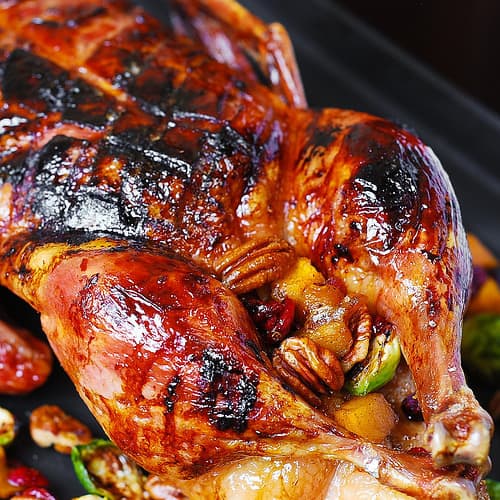
 1592 views
1592 viewsRoast Duck Recipe
juliasalbum.com
4.9
(176)
180 minutes
Your folders
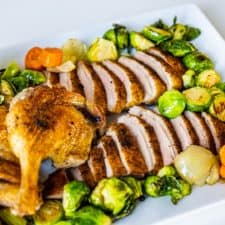
 263 views
263 viewsRoast duck recipe/roast goose recip...
blog.thermoworks.com
5.0
(1)
Your folders
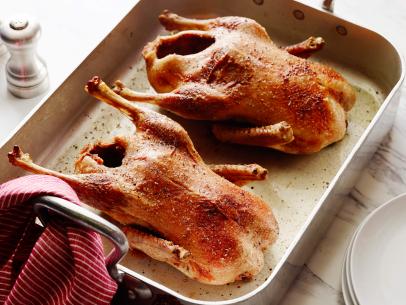
 502 views
502 viewsRoast Duck
foodnetwork.com
4.6
(79)
1 hours
Your folders

 436 views
436 viewsRoast Duck
cooking.nytimes.com
4.0
(149)
Your folders

 430 views
430 viewsRoast Duck
foodnetwork.com
4.3
(10)
2 hours
Your folders

 221 views
221 viewsRoast Duck
ohmyfoodrecipes.com
5.0
(122)
80 minutes
Your folders
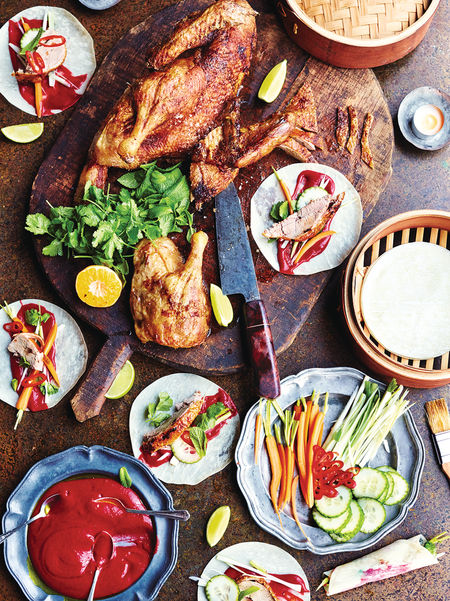
 459 views
459 viewsRoast duck
jamieoliver.com
Your folders
 214 views
214 viewsRoast Duck
foodnetwork.com
4.7
(7)
3 hours, 30 minutes
Your folders
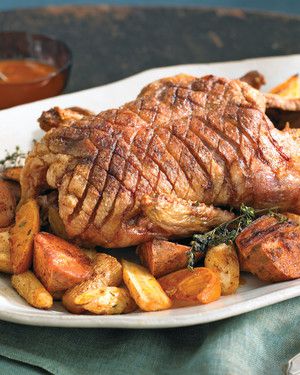
 267 views
267 viewsRoast Duck
marthastewart.com
Your folders
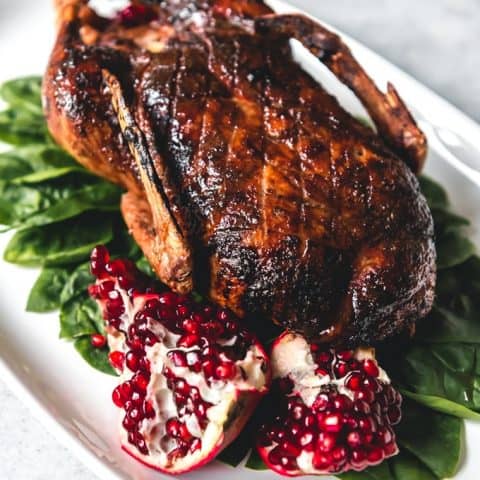
 234 views
234 viewsHoney Roast Duck Recipe
houseofnasheats.com
4.4
(83)
2 hours
Your folders
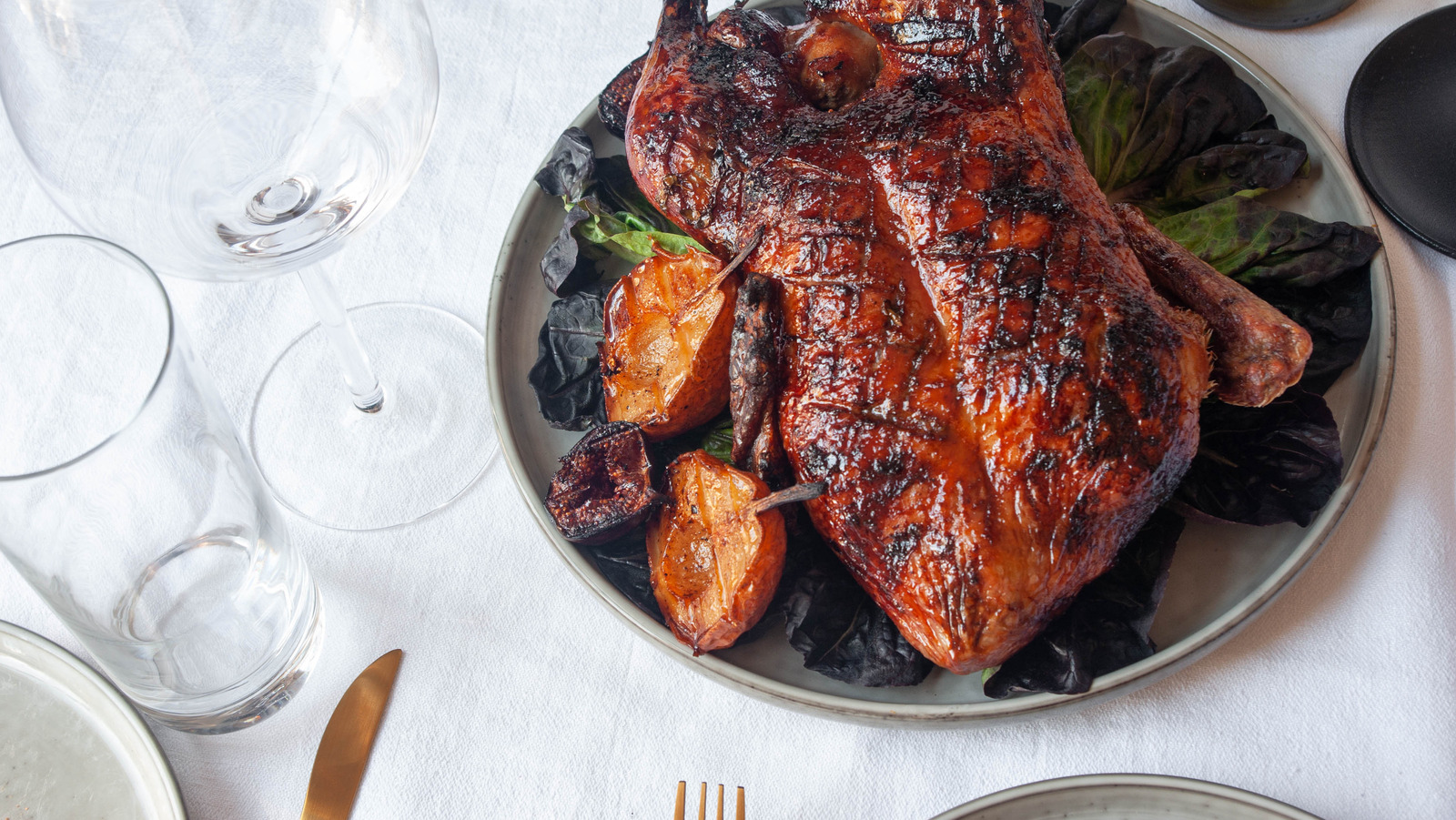
 234 views
234 viewsCrispy Roast Duck Recipe
tastingtable.com
5.0
(59)
3 hours, 15 minutes
Your folders

 362 views
362 viewsRoast duck laksa
taste.com.au
5.0
(1)
22 minutes
Your folders

 563 views
563 viewsLingonberry Roast Duck
food.com
5.0
(3)
2 hours
Your folders

 860 views
860 viewsEasy Roast Duck
cooking.nytimes.com
4.0
(326)
Your folders

 544 views
544 viewsBasic Roast Duck
cooking.nytimes.com
5.0
(47)
Your folders
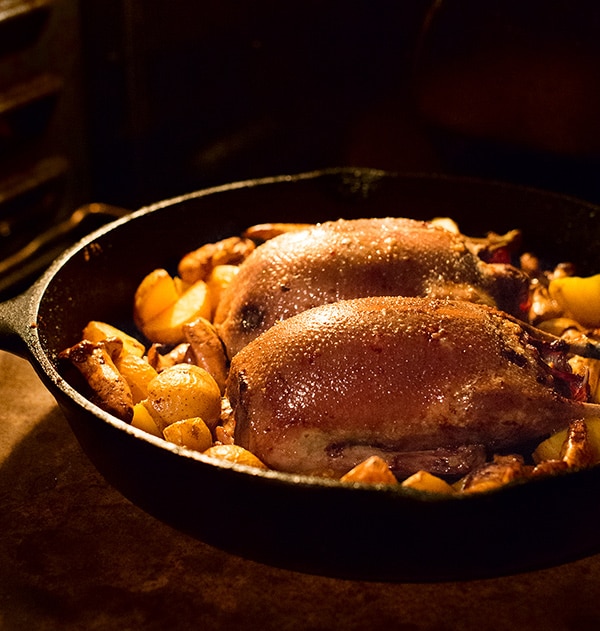
 737 views
737 viewsSlow Roast Duck
honest-food.net
4.9
(14)
90 minutes
Your folders

 204 views
204 viewsRoast Wild Duck
honest-food.net
4.9
(28)
20 minutes
Your folders

 327 views
327 viewsCrisp Roast Duck
cooking.nytimes.com
4.0
(44)